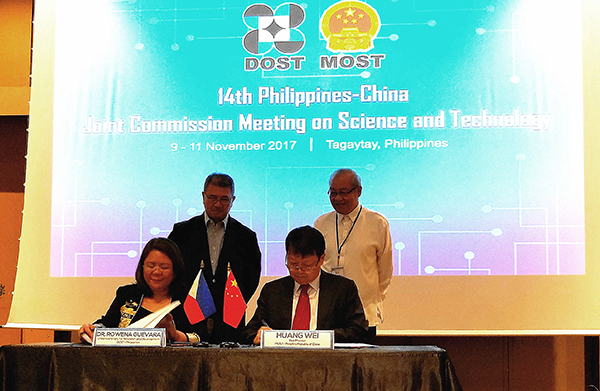
On November 10, 2017, the 14th Meeting of the China-Philippines Joint Commission on Science and Technology (S&T) Cooperation was held in the Philippines. The meeting was co-chaired by Huang Wei, Vice Minister of Science and Technology of China, and Rowena Guevara, Undersecretary of the Department of Science and Technology of the Philippines. This meeting is an important milestone after the two countries resumed bilateral cooperation in science and technology innovation (STI).
In his speech, Vice Minister Huang pointed out that China and the Philippines are friendly neighbors and the two sides had accomplished fruitful results in STI cooperation in the past. Since 2016, the Ministry of Science and Technology (MOST, China) and the Department of Science and Technology of the Philippines have proactively planned to restore bilateral STI cooperation. STI has always been a great concern of the Chinese government. At the recently concluded 19th National Congress of the Communist Party of China (CPC), General Secretary Xi Jinping pointed out that China must resolutely implement an innovation-driven development strategy and speed up efforts to build itself into an innovative country if it is to achieve the two centenary goals, realize the Chinese Dream of national rejuvenation and continue to improve people‘s livelihood. The Belt and Road Science and Technology Innovation Cooperation Initiative put forward by General Secretary Xi Jinping has brought new opportunities for STI cooperation between the two countries. Against this backdrop, it is a new starting point in a new era to hold the meeting of the China-Philippines Joint Commission on Science and Technology Cooperation which had been suspended for more than 10 years to restart bilateral STI cooperation. China is willing to engage in pragmatic cooperation with the Philippines in the building of joint laboratories, people-to-people S&T exchanges, science park cooperation and technology transfer so that the two sides can enhance their S&T capacity building and promote socio-economic development for the benefit of the peoples.
Undersecretary Guevara said that the Philippines attaches great importance to the STI development. Within the framework of the Philippine Government’s long-term vision“Target 2040”, an agenda for Science and Technology Innovation and Development, which includes strategies for research and development (R&D) of S&T, industrial development, capacity building and enhanced cooperation, has been formulated. Supported by the National R&D Coordinated Development Agenda and the Program of Promoting Change Through S&T, the Philippines has launched a program of serving the people through S&T, and has made major S&T progress in recent years. The Philippine side is willing to work with the Chinese side to further deepen bilateral STI cooperation and promote the development of friendly relations between the two countries within the framework of the China-Philippines Intergovernmental Joint Commission on Science and Technology Cooperation.
The two sides reached consensuses in the fields and form of priority cooperation for the next stage. Under the witness of Secretary Fortunato de la Peña of the Department of Science and Technology of the Philippines and Philippine Ambassador to China H.E. Jose Romana, Vice Minister Huang Wei and Undersecretary Guevara signed the Protocol of the 14th Meeting of the China-Philippines Joint Commission on Science and Technology Cooperation. After the meeting, Vice Minister Huang Wei and Secretary Peña exchanged in-depth views on promoting bilateral STI cooperation.
The meeting was attended by Chinese representatives from the Department of Basic Research and Department of International Cooperation of MOST, the Department of Science and Technology of Jiangxi Province, the Department of Science and Technology of Shandong Province, the Department of Science and Technology of Guangxi Province, the Department of Science and Technology of Yunnan Province and China Center for Resources Satellite and Application, and Philippine Ambassador to China Jose Romana, Assistant Secretary for Science and Technology of the Philippines Leah Buendia, as well as heads and representatives from institutions including the Philippine Council for Agriculture, Aquatic, and Natural Resources Research and Development, Council for Health Research and Development, Council for Industry, Energy and Emerging Technology Research and Development, the Atmospheric, Geophysical and Astronomical Services Administration, the Industrial Technology Development Institute, the Technology Application and Promotion Institute and the Science Education Institute.
During his visit to the Philippines, Vice Minister Huang Wei also called upon Chinese Ambassador to the Philippines Zhao Jianhua and visited S&T administrative bodies and research institutions including the International Rice Research Institute, the University of the Philippines Los Banos (UPLB), the Philippine Council for Agriculture, Aquatic, and Natural Resources Research and Development and the Forest Products Research and Development Institute. The visits greatly promoted the pragmatic S&T cooperation between China and the Philippines.

